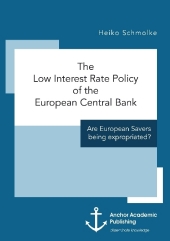 Neuerscheinungen 2017Stand: 2020-02-01 |
Schnellsuche
ISBN/Stichwort/Autor
|
Herderstraße 10
10625 Berlin
Tel.: 030 315 714 16
Fax 030 315 714 14
info@buchspektrum.de |

Heiko Schmolke
The Low Interest Rate Policy of the European Central Bank. Are European Savers being expropriated?
2017. 144 S. 31 Abb. 270 mm
Verlag/Jahr: ANCHOR ACADEMIC PUBLISHING 2017
ISBN: 3-9606711-9-9 (3960671199)
Neue ISBN: 978-3-9606711-9-0 (9783960671190)
Preis und Lieferzeit: Bitte klicken
Central banks around the world have lowered their key interest rates to historical lows and implemented large asset purchase programs in the past few years. Within the scientific and, most recently, also increasingly in the political debate, the nominal interest rate is mainly the subject of discussion. The question is often raised whether saving and retirement provision are still worthwhile for private households, especially in Germany. In this context it is often ignored or not considered that the purchasing power of the nominal interest rates fluctuates considerably with the inflation rate. Inflation-adjusted real interest rates are therefore decisive for the actual income from financial assets and crucial for the savings and investment behavior. This study, therefore, shall play ist part to investigate scientifically the influence and correlation of low and negative key interest rates on yield levels of selected asset classes within the sphere of influence of the European Central Bank. In this context, the mainly populist question is also answered whether savers are expropriated slowly.
Heiko Schmolke holds a bachelor´s degree in business administration and engineering from the Technical University of Berlin and an MBA from the FOM University of Applied Sciences for Economics and Management in Germany. He works as a management consultant in Germany for several years and has extensive expertise in the field of finance and trading. He has solid professional experience as an analyst and has published various articles and books on topics of finance and politics, e.g. the impact of U.S. Fed bond purchases on inflation since 2008 or the impact of US labor market reports and FOMC meetings on the foreign exchange market.


